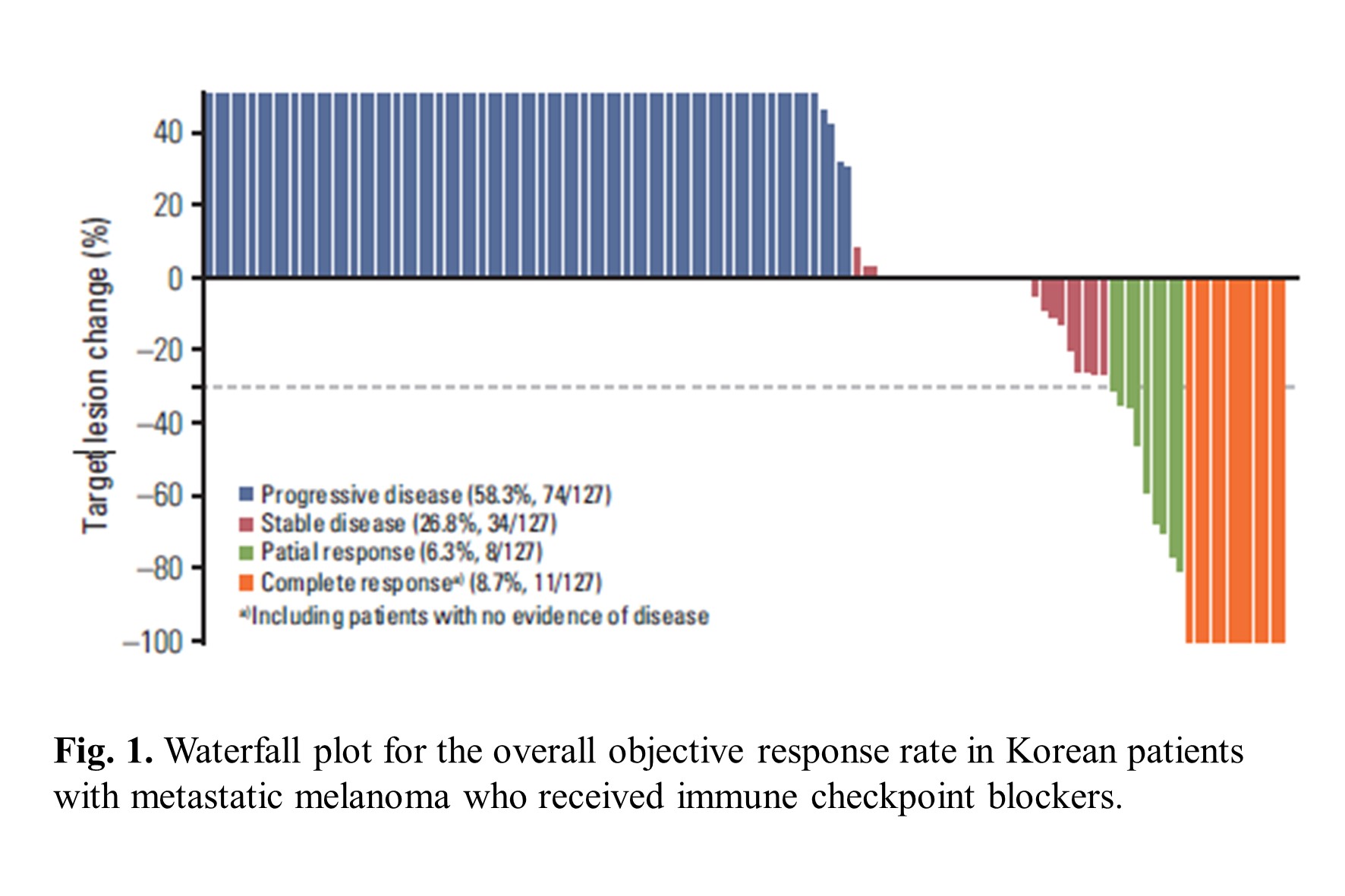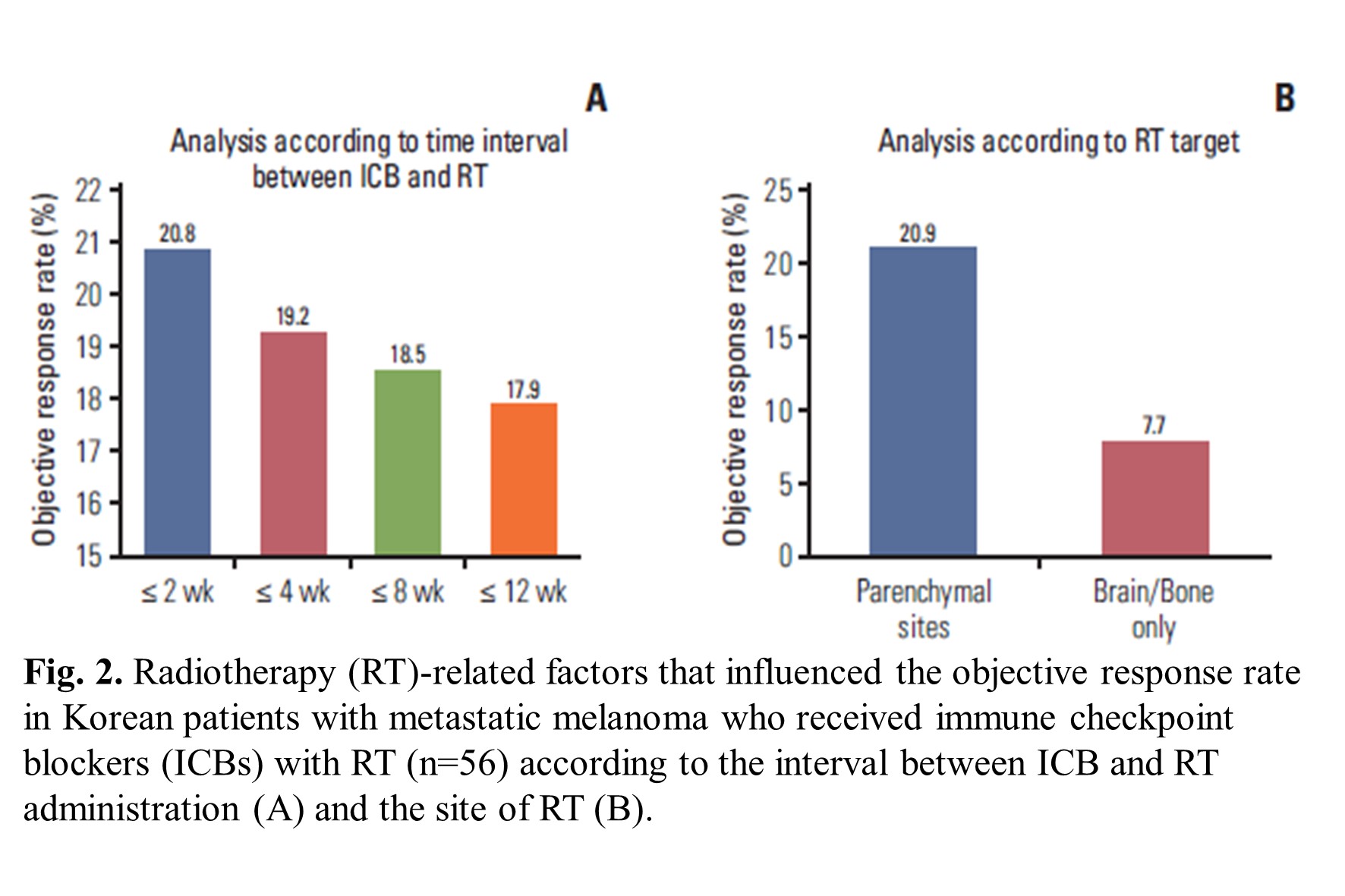글로벌 연구동향
방사선종양학
- [Cancer Res Treat.] Clinical Outcomes of Immune Checkpoint Blocker Therapy for Malignant Melanoma in Korean Patients: Potential Clinical Implications for a Combination Strategy Involving Radiotherapy
연세의대 / 이정심, 장지석, 금웅섭*, 신상준*
- 출처
- Cancer Res Treat.
- 등재일
- 2020 Jul
- 저널이슈번호
- 52(3):730-738. doi: 10.4143/crt.2019.598. Epub 2020 Feb 13.
- 내용
Abstract
Purpose: We investigated the clinical efficacy of immune checkpoint blocker (ICB) therapy for metastatic or advanced melanoma in Korean patients. As well, we assessed whether the effects of ICBs can be enhanced by combination therapy with palliative radiotherapy (RT).Materials and methods: We retrospectively reviewed the records of 127 patients with metastatic melanoma who received ICB with or without palliative RT between 2014 and 2018. The melanoma subtypes were classified as follows: chronic sun-damaged (CSD), acral, mucosal, and uveal. The primary endpoint was the objective response rate (ORR).
Results: The overall ORR was 15%, with 11 complete and eight partial responses. ORRs for CSD, acral/mucosal, and uveal melanomas were 50%, 16.5%, and 0%, respectively (p=0.009). In addition to the subtype, stage at treatment, total tumor burden at treatment, and ICB type were significantly associated with ORR (all p < 0.05). Palliative RT was administered in 44% of patients during the treatment, and it did not affect ORR. Clinical responders to ICB therapy exhibited significantly higher 1-year progression-free and overall survival rates than nonresponders.
Conclusion: ORR for ICB monotherapy in Korean patients with melanoma is relatively modest compared with that in Western patients because the non-CSD subtypes are predominant in the Korean population. Our findings regarding combination therapy with ICB provided a rationale for the initiation of our phase II study (NCT04017897).


Affiliations
Jeongshim Lee 1 2 , Jee Suk Chang 1 , Mi Ryung Roh 3 , Minkyu Jung 4 , Choong-Kun Lee 4 , Byung Ho Oh 3 , Kee Yang Chung 3 , Woong Sub Koom 1 , Sang Joon Shin 4
1 Department of Radiation Oncology, Yonsei University College of Medicine, Seoul, Korea.
2 Department of Radiation Oncology, Inha University Hospital, Incheon, Korea.
3 Department of Dermatology, Yonsei University College of Medicine, Seoul, Korea.
4 Division of Medical Oncology, Department of Internal Medicine, Yonsei University College of Medicine, Seoul, Korea.
- 키워드
- Asia; Immune checkpoint blocker; Immunotherapy; Melanoma.
- 연구소개
- 한국의 전이성 흑색종에 대한 면역치료(면역관문억제제)의 효과를 확인하고, 그것을 높이기 위한 전략적 방법을 살펴보고자 시행한 연구입니다. 특히, 방사선치료는 면역치료와의 시간적, 공간적 상호 관계 속에서 면역 기능을 자극하고 강화하여 면역치료의 항암효과를 높일 수 있는 최적의 파트너 치료이기 때문에, 방사선치료와의 결합을 통해 면역치료의 항암효과를 올릴 수 있는 임상적 방향을 제시하였습니다. 따라서 본 연구의 결과는 암을 치료하는 종양학자와 암연구자들에게 참고가 될 만한 좋은 정보라고 판단됩니다.
- 덧글달기
- 이전글 [PLoS One.] Predictive value of interim 18F-FDG-PET in patients with non-small cell lung cancer treated with definitive radiation therapy
- 다음글 [Radiother Oncol.] Postoperative radiotherapy for WHO grade II-III intracranial ependymoma in adults: An intergroup collaborative study (KROG 18-06/KNOG 18-01)









